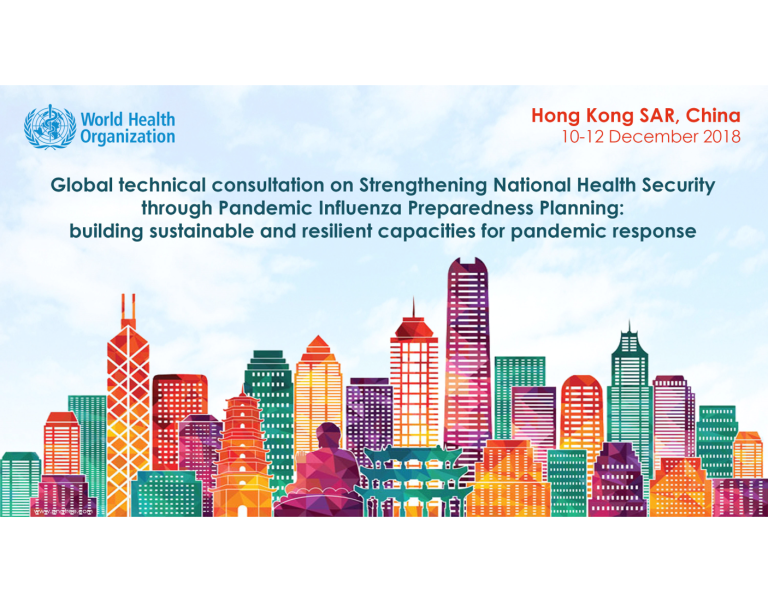
Global Technical Consultation on Strengthening National Health Security through Pandemic Influenza Preparedness Planning: building sustainable and resilient capacities for pandemic response
December 10, 2018
Influenza pandemics are unpredictable but recognized as recurring events that can have serious consequences on human health and economic well-being worldwide. After an outbreak of Avian Influenza (H5N1) virus in 1997 in poultry in Hong Kong SAR, China, in 2003, the avian and other influenza viruses have spread globally. In 2013, advanced planning and preparedness to ensure the capacities for a rapid and efficient pandemic response is critical for countries to mitigate the risk and impact of a pandemic.
Following the 2009 influenza pandemic, WHO supported several initiatives for Member States to be better prepared to Pandemic Influenza such as Pandemic Influenza Preparedness (PIP) Framework in 2011 and other important updates were introduced in 2017 for “Pandemic Influenza Risk Management” framework (PIRMF).
The recently published WHO pandemic preparedness checklist mapped pandemic response capacities with the indicators of the International Health Regulations (IHR (2005)) and the Joint External Evaluation (JEE) indicators to draw a direct link to the essential capacities needed to manage the risk and impact of pandemic influenza with the core capacities required to manage broader health security threats. It is also an effective tool for countries to assess current level of preparedness and identify priorities for countries’ efforts in pandemic influenza preparedness planning in the context of strengthening IHR core capacity and health security.
In addition to the above, WHO held a series of global meetings between 2015 and 2017 to monitor and track the progress of global health security at country level related to the Joint External Evaluations (JEE), National Action Plans for Health Security (NAPHS) as well as other tools and initiatives. Taking into account that the threat of epidemics and emergencies is universal, the Strategic Partnership for IHR and Health Security (SPH) team of Country Health Emergency Preparedness and IHR department (CPI) of WHE, together with the Global Influenza Programme of Infectious Hazard Management department of WHO HQ held a global stakeholder consultation on “National Health Security and Pandemic Influenza Preparedness Planning”, attended by 30 countries from WHO regions, in December 2017, in Accra, Ghana.
This Global Technical Consultation to be held in December 2018 in Hong Kong will explore synergetic approaches and tools to leverage pandemic influenza preparedness planning and strengthening IHR core capacities and align these with health security priorities.
The overall objectives of the Hong Kong meeting are to further explore a more synergetic approach to leverage pandemic influenza preparedness planning and strengthening IHR capacities in countries as well as alignment with health security priorities at national, regional and global level. The specific objective is the following:
- To introduce the most up-to-date WHO strategies and guidance on health security and pandemic preparedness planning including the available tools and its convergence;
- To facilitate the exchange of experiences and practices in linking the pandemic preparedness and health security planning processes by assessing the current level of influenza pandemic preparedness using JEE and IHR self-assessment outcomes
- To introduce an innovative and cost-effective way for assessing the current level of pandemic preparedness by introducing the capacity progress indicator tool and costing tools specific to pandemic influenza planning as well as resource mapping tool for health security;
Expected outcome:
- o Consensus on the stepwise approach to review and revised the pandemic influenza preparedness plan through various tools such as the capacity progress indicator tool and costing tool specific to pandemic influenza planning as well as resource mapping in the country context;
- o Consensus on template of good practices, models for the implementation of the national pandemic influenza preparedness plan and aligning with the health security planning.
- o Consensus on testing and piloting the step-wise approach of review and revise pandemic influenza preparedness and health security plans in different countries of different WHO regions.